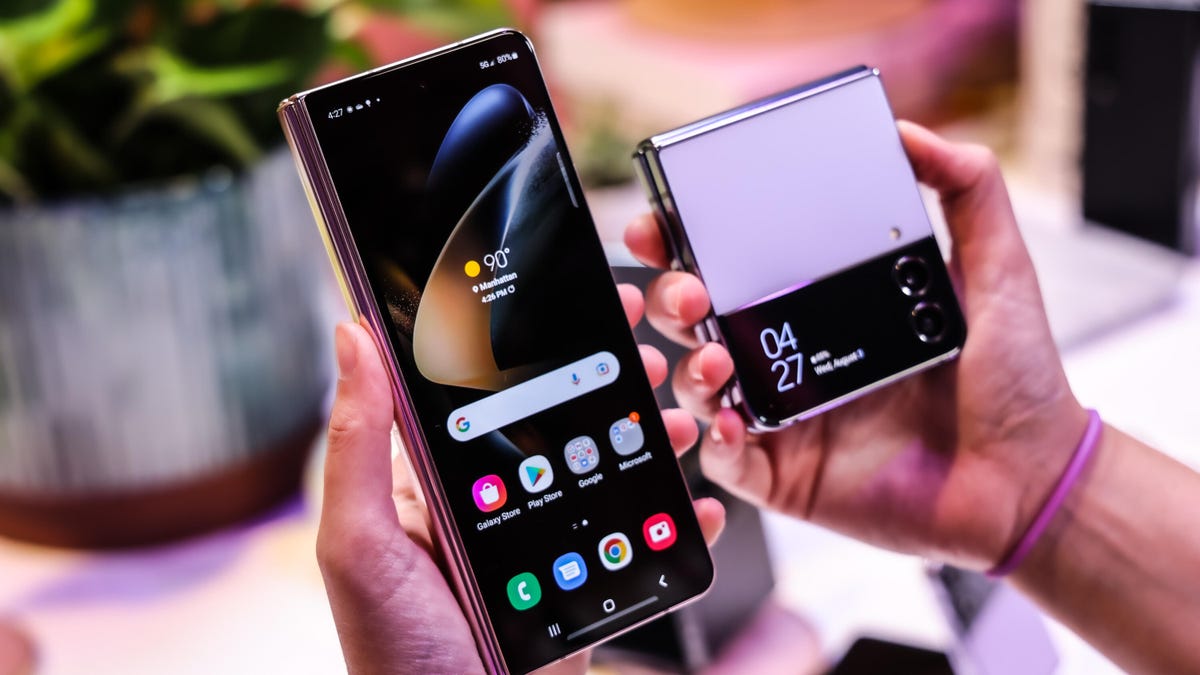Samsung's New Z Flip 4, Z Fold 4 Are Partially Made From Recycled Fishing Nets

The Galaxy Z Fold 4 (left) and Z Flip 4 (right).
What's happening
Samsung's new Galaxy Z Flip 4 and Z Fold 4 are the first folding phones from the company to be made partially with recycled fishing nets.
Why it matters
Samsung's efforts are part of a broader effort by several tech companies to build products more sustainably.
What's next
Samsung, Microsoft and Apple are likely to continue investments into sustainability, with various pledges to become either carbon-neutral or to increase use of recycled materials.
The Galaxy Z Flip 4 and Z Fold 4 will include components made from repurposed fishing nets, marking a first for Samsung's foldables. It builds on Samsung's previous efforts, following its decision to incorporate such materials into its Galaxy S22 lineup earlier this year.
The announcement came during Samsung's Unpacked event on Wednesday, when it revealed the Galaxy Z Flip 4 and Z Fold 4 as well as the Galaxy Buds 2 Pro, the Galaxy Watch 5 and Galaxy Watch 5 Pro. All of the new devices include some components made from repurposed materials. More than 90% of the Galaxy Buds 2 Pro are made from recycled parts.
Samsung's efforts are part of a broader movement by consumer tech companies to offset the mounting pile of global electronic waste their devices inevitably contribute to by giving back to the environment. Only 20% of e-waste is dealt with appropriately, according to the World Economic Forum, while much of the rest ends up in landfills. Sourcing more materials from sustainable channels may not fix the world's electronic waste problem. But it does give tech companies the opportunity to contribute to solving other environmental issues in the process of building their own new gadgets.
More from Samsung Unpacked
Samsung's new foldables include components made from repurposed fishing nets.
For Samsung, that issue is "ghost nets," or fishing nets that are no longer in use and have been abandoned in the ocean. The World Wildlife Fund describes them as a "major contributor to the ocean plastics crisis," saying that 268 tons of nets, ropes and other materials were found in the Baltic Sea in a single 2015 mission.
As for specifics, the side key bracket on the Galaxy Z Flip 4 and Z Fold 4, as well as the Fold 4's display connector cap, are made from discarded fishing nets. But there are several other parts inside each phone that are made from other post-consumer materials. For the Z Flip 4, such components include the upper antenna bracket, upper and lower brackets of the speaker module, display connector cap, receiver deco and inner part of the side key. The upper case of the Z Fold 4's top speaker, the inner part of its side key as well as its long and short connector to connector brackets are made from post-consumer materials, according to Samsung.
One of the major challenges with creating components from recycled fishing nets is ensuring these parts are durable enough to work properly in a variety of conditions. Phone parts must be designed to survive various extreme weather conditions in all areas of the world where Samsung devices are used, says Pranveer Singh Rathore, materials R&D manager for Samsung. That's particularly true of foldable phones like the Z Flip 4 and Z Fold 4.
"They are a unique design, and with that comes a fresh set of challenges," says Rathore, in reference to Samsung's foldable phones. "The internal parts are different. The sizes are different. The way they are supposed to perform is different."
Certain components in new Samsung products like the Galaxy Z Flip 4 and Galaxy Watch 5 are made from recycled materials.
Samsung is far from being the only company investing in more sustainable ways to build new products. Microsoft pledged to become carbon-neutral, zero-waste and water-positive by 2030, and it launched a computer mouse made with 20% recycled ocean plastic last year. Apple is making the latest iPhone SE with low-carbon aluminum and wants to eventually only use recycled and renewable materials in its products and packaging.
But the industry is likely far from creating a phone completely from recycled materials, says Rathore.
"I personally think that it should be possible in the future," he said. "But when, I don't know."
Read more: The Great Pacific Garbage Patch: What to Know About the Floating Islands of Trash

